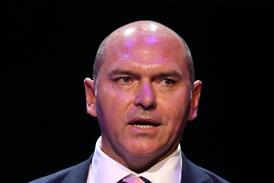- Postponing operations, discharging patients and buying up private beds will increase capacity
- Trusts must increase capacity for ventilators where possible
- Cost “will not stand in the way” of coronavirus action
The NHS is targeting freeing up 30,000 beds by postponing all non-urgent elective operations and discharging all inpatients who are “medically fit to leave”.
Block-buying beds from independent providers and freeing up community hospital and intermediate care beds could free up another 10,000 beds, according to a letter sent to trusts by NHS chief executive Sir Simon Stevens and chief operating officer Amanda Pritchard today.
Trusts were asked to postpone non-urgent planned surgeries from 15 April for at least three months, and in the meantime are allowed to “wind down” operations as they see best. This could free up 12-15,000 beds, NHSE estimates.
Acute trusts are to discharge all inpatients who are “medically fit to leave”, with community health providers taking “full responsibility” for all patients on acute trust discharge lists. This could potentially free up 15,000 beds, NHSE said.
The government will put emergency legislation before Parliament aimed at ensuring assessments of eligibility for funding do not delay the discharge of patients who need social care.
“Trusts and [clinical commissioning groups] will need to work with local authority partners to ensure that additional capacity is appropriately commissioned,” the letter said.
Money will not be an issue, the letter continued, as “new government funding for these discharge packages and to support the supply and resilience of out-of-hospital care more broadly is being made available”.
The letter also confirmed plans to block-buy private sector beds, and told trusts to free up their private patient unit beds to deliver extra capacity — a move likely to reduce income for some of them.
Around 1,120 beds within the NHS are available for private patients, according to think tank the Centre for Health and the Public Interest, with income of around £600m a year, concentrated in London.
Critical care and ventilation
In addition to freeing up extra beds, trusts have been asked to “enhance” their ventilation capacity as far as possible.
Sir Simon also told the Commons health and social care committee today that the NHS had access to 8,175 ventilators and was procuring some 3,000 more.
It is not clear how many of the 30,000 further beds are aimed at having the facility of providing full mechanical ventilation, or non-invasive oxygen. But trusts have been asked to make as many beds, critical care bays and theatres ventilation-ready as possible.
The letter stated national procurement for ventilators was “well underway,” but did not provide more detail on the government’s plan to switch British manufacturers onto the devices. Engineers recently told HSJ it could take “several weeks, if not months,” for other firms to make a significant impact on the availability of ventilators. Existing ventilation manufacturers have also ramped up activity.
An effort to make these devices available across the four nations will be led by Mark Brandreth, chief executive of Robert Jones and Agnes Hunt Orthopaedic Hospital Foundation Trust.
Downloads
FINAL LETTER
PDF, Size 0.2 mb
Source
Sir Simon Stevens’ letter
Source Date
March 2020
Covid-19 staff rules relaxed after ‘disaster’ concern
- 1
- 2
 Currently reading
Currently readingNHS to free up 30,000 beds for coronavirus
- 3
- 4





























6 Readers' comments